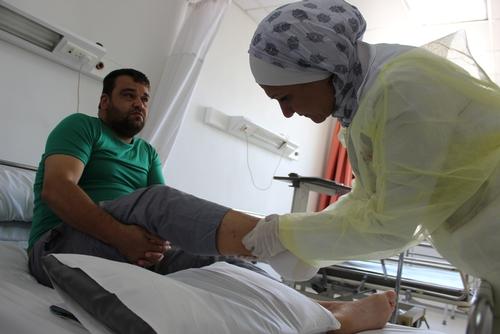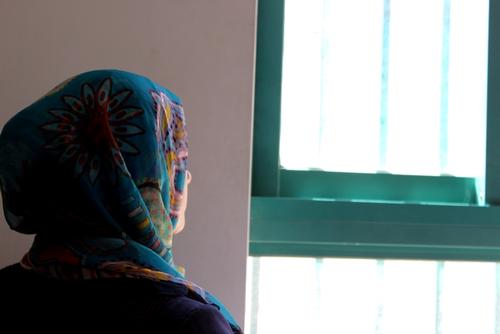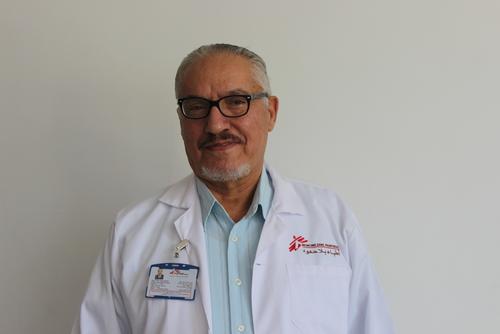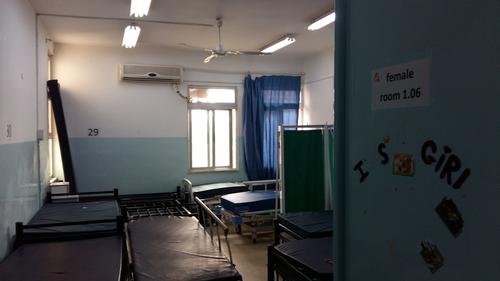Erfan Amari: “The war in Syria did not leave us much hope"
“I had a severe leg injury by a shell that was dropped on my village (Namer) in Daraa. It happened towards the end of 2012. I only arrived to MSF's hospital in Amman, Jordan last month. My injury did not heal throughout the years following it, and I did not receive a proper medical attention I needed. My injury was caused by splinters, and my foot had to be amputated two years after the incident, due to a major infection, that is still being treated till now.
I was hospitalized immediately to a field hospital in Syria, where the wound was surface-cleaned only. A few months later, I left to Jordan accompanied by my wife, and we headed to Al Zaatari Syrian Refugees Camp. My suffering continued there, which unfortunately led to my foot being amputated in 2014, due to being diagnosed with an antibiotics resistant severe infection. I was expecting the pain to go away after the surgery, but I started to feel it again a few days later.
I met a doctor from MSF during his visit to Al Zaatari Camp, and he told me about the possibility of having my case treated, and having the inflammation contained. I was approved for treatment at the MSF`s hospital early June 2016, and there started another treatment process. It began with a deep cleaning for the wound, and a treatment with antibiotics, which the bacteria was not resistant to, and there is a possibility for another surgical intervention to contain the infection.
The war in Syria did not leave us much hope; all I hope for is for my leg to be saved, so I can reunite with my Family at Al Zaatari camp. The living circumstances there are extremely difficult, and they need me by their side.”

Nora Abdullah: “We are surrounded by danger every single second.”
‘’I arrived to Jordan first time at the end of September last year, and I had to undergo nine surgical interventions. My injuries were quite severe, especially in the face and jaw area, which was caused by a bomb explosion in my house in Beit Lahiya.
I can still remember every single detail of the day of the incident. It was around 09:00 AM, on the second day of Eid Al-fitr in 2014, during the Gaza war.
I was preparing breakfast in the kitchen, and all of a sudden, a shell came through the window and exploded. My husband passed away immediately, and I got severely injured in my lower jaw. Luckily, none of my three daughters was hurt, as the explosion was far from their room. My husband died in his bed, and the emergency team could not do anything to save his life.
I was hospitalized immediately to Al Shifaa hospital in Gaza, where I had to undergo a few surgeries, including skin grafts, and clearing splinters off my body. This treatment lasted for over a month, before I was transferred to Egypt to continue the treatment. I had to undergo three surgeries in Egypt; my face and lower jaw were severely damaged, and I needed a more specialized care, so I decided to go back to Gaza, in order to be closer to my family.
We waited for a year, before we got an approval to travel to Jordan. We had applied for a treatment at MSF`s Surgical and Rehabilitation of War Casualties hospital, and luckily I was able to travel to Jordan with my father. We arrived there after a long and tiresome journey, but it was worth it. After the surgeries were done, my lower jaw movement got much better, and my ability to talk and eat improved so much. I am very happy that this phase of treatment is over, and I can go back to my family, within a few weeks’ time.
The Gaza war taught us that the price of preparing a breakfast meal can prove to be very costly; we are surrounded by danger every single second.’’






